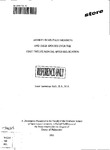ANXIETY IN MILITARY MEMBERS AND THEIR SPOUSES OVER THE FIRST TWELVE MONTHS AFTER RELOCATION
| dc.contributor.author | Sanneman Kelly, Susan | |
| dc.contributor.other | Faculty of Health | en_US |
| dc.date.accessioned | 2013-10-11T09:56:28Z | |
| dc.date.available | 2013-10-11T09:56:28Z | |
| dc.date.issued | 1995 | |
| dc.identifier | NOT AVAILABLE | en_US |
| dc.identifier.uri | http://hdl.handle.net/10026.1/2171 | |
| dc.description.abstract |
Research of the impact of relocation has failed to produce a theoretical foundation and is predominantly polarized into positive and negative effects. Two themes, however, recur throughout the literature: a) the experience of relocation includes loss, and b) wives feel the impact of relocation more severely than their husbands. Parkes' theory of psychosocial transition (1971) encapsulates the theme of loss. In this study, anxiety of 314 active duty men and women and their civilian spouses was measured 1-12 months after a military move to explore the fit of Parkes' model to relocation. Impacts of relocation by gender and roles (active duty versus civilian) were compared. In a qualitative component to the study, gains and losses created by the relocation were also explored along with behaviors that helped subjects feel more at home in the new place. A 2x2x2 factorial design was used with three independent variables of time since move, gender and role. The dependent variable was state anxiety as measured by the State-Trait Anxiety Inventory (STAI), Form Y (Spielberger, 1983). A .05 level of significance was used in the hypothesis testing. As proposed by Parkes' psychosocial transition model, military couples that had relocated 1-6 months previous scored significantly higher in state anxiety than military couples who had moved 7-12 months previous. Members and spouses also differed significantly in anxiety across education levels, ranks, and ages, as well as number of children living with the couple. Results of this project support previous findings that relocation impacts women more intensely than men, but not for the previously purported reason - lack of familiar work setting. Women exhibited significantly higher levels of anxiety whether they were employed full time (active duty) or civilian spouses following their active duty husbands. Each group of subjects overwhelmingly identified loss of friends as a severe loss due to the move. For subjects on active duty, the most positive gains of relocation during the first year were family closeness and benefits of new jobs. The dominant theme for the civilian spouses was the benefits of the new environment. Buying and working on new homes was the most helpful behavior for all groups during the first year after relocation. | en_US |
| dc.language.iso | en | en_US |
| dc.publisher | University of Plymouth | en_US |
| dc.title | ANXIETY IN MILITARY MEMBERS AND THEIR SPOUSES OVER THE FIRST TWELVE MONTHS AFTER RELOCATION | en_US |
| dc.type | Thesis | |
| dc.identifier.doi | http://dx.doi.org/10.24382/4220 |
Files in this item
This item appears in the following Collection(s)
-
01 Research Theses Main Collection
Research Theses Main


